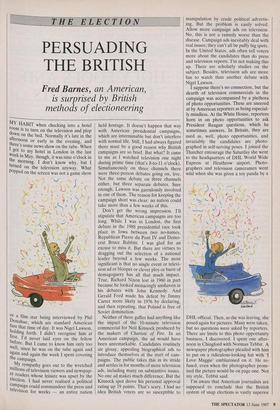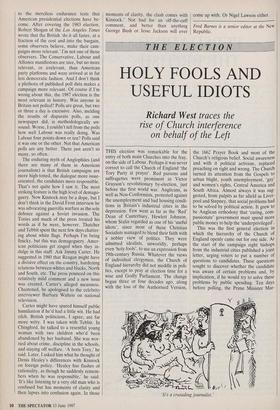THE ELECTION
PERSUADING THE BRITISH
Fred Barnes, an American,
is surprised by British methods of electioneering
MY HABIT when checking into a hotel room is to turn on the television and plop down on the bed. Normally it's late in the afternoon or early in the evening, and there's some news show on the tube. When I got to my hotel in London in the last week in May, though, it was nine o'clock in the morning. I don't know why, but I turned on the television anyway. What Popped on the screen was not a game show or a film star being interviewed by Phil Donahue, which are standard American fare that time of day. It was Nigel Lawson, holding forth. I didn't recognise him at first. I'd never laid eyes on the fellow before. But I came to know him only too well, since he was on the tube again and again and again the week I spent covering the campaign. My sympathy goes out to the wretched millions of television viewers and newspap- er readers whose leisure was upset by the election. I had never realised a political campaign could commandeer the press and television for weeks — an entire nation held hostage. It doesn't happen that way with American presidential campaigns, which are interminable but don't interfere with normal life. Still, I had always figured there must be a good reason why British campaigns are so brief. But what? It came to me as I watched television one night during prime time (that's 8-to-11 o'clock). Simultaneously on three channels there were three-person debates going on, live. Not the same debate on three channels either, but three separate debates. Sure enough, Lawson was garrulously involved in one of them. The reason for keeping the campaign short was clear: no nation could take more than a few weeks of this.
Don't get the wrong impression. I'll stipulate that American campaigns are too long. While I was in London, the first debate in the 1988 presidential race took place in Iowa between two no-names, Republican Pierre du Pont IV and Demo- crat Bruce Babbitt. I was glad for an excuse to miss it. But there are virtues to dragging out the selection of a national leader beyond a few weeks. The most significant is that no single event or televi- sion ad or blooper or clever ploy or burst of demagoguery has all that much impact. True, Richard Nixon lost in 1960 in part because he looked menacingly unshaven in his debates with John Kennedy. And Gerald Ford made his defeat by Jimmy Carter more likely in 1976 by declaring, and then repeating, that Poland is free of Soviet domination.
Neither of these gaffes had anything like the impact of the 10-minute television commercial for Neil Kinnock produced by the makers of Chariots of Fire. In an American campaign, the ad would have been unremarkable. Candidates routinely air glossy, appealing biographical ads to introduce themselves at the start of cam- paigns. The public takes this in its stride and settles in for months of more television ads, including many on substantive issues. No one ad makes much difference. But the Kinnock spot drove his personal approval rating up 19 points. That's scary. I had no idea British voters are so susceptible to manipulation by crude political advertis- ing. But the problem is easily solved. Allow more campaign ads on television. No, this is not a remedy worse than the disease. Campaign ads inevitably deal with real issues; they can't all be puffy big spots. In the United States, ads often tell voters more about the candidates than do press and television reports. I'm not making this up. There are scholarly studies on the subject. Besides, television ads are more fun to watch than another debate with Nigel Lawson. I suppose there's no connection, but the dearth of television commercials in the campaign was accompanied by a plethora of photo opportunities. These are sneered at by American reporters as being especial- ly mindless. At the White House, reporters horn in on photo opportunities to ask President Reagan questions, which he sometimes answers. In Britain, they are used as, well, photo opportunities, and invariably the candidates are photo- graphed in self-serving poses. I joined the Thatcher entourage the Saturday she went to the headquarters of DHL World Wide Express at Heathrow airport. Photo- graphers and television cameramen went wild when she was given a toy panda by a DHL official. Then, as she was leaving, she posed again for pictures. Many were taken, but no questions were asked by reporters. There are limits to this photo opportunity business, I discovered. I spent one after- noon in Chingford with Norman Tebbit. A newspaper photographer pleaded with him to put on a ridiculous-looking hat with 'I Love Maggie' emblazoned on it. He re- fused, even when the photographer prom- ised the picture would be on page one. Not my style, Tebbit said.
I'm aware that American journalists are supposed to conclude that the British system of snap elections is vastly superior to the merciless endurance tests that American presidential elections have be- come. After covering the 1983 election, Robert Shogan of the Los Angeles Times wrote that the British 'do it all faster, at a fraction of the cost and into the bargain, some observers believe, make their cam- paigns more relevant.' I'm not one of those observers. The Conservative, Labour and Alliance manifestoes are nice, but no more relevant, or irrelevant, than American party platforms and were arrived at in far less democratic fashion. And I don't think a plethora of published poll data makes a campaign more relevant. Of course if I'm wrong about this, the 1987 election is the most relevant in history. Was anyone in Britain not polled? Polls are great, but two or three a day is excessive. Also, melding the results of disparate polls, as one newspaper did, is methodologically un- sound. Worse, I couldn't tell from the polls how well Labour was really doing. Was Labour four points down or ten? Polls said it was one or the other. Not that American polls are any better. There just aren't so many, so often.
The enduring myth of Anglophiles (and there are many of them in American journalism) is that British campaigns are more high-toned, the dialogue more issue- oriented, the candidates more responsible. That's not quite how I saw it. The most striking feature is the high level of demago- guery. Now Kinnock may be a dope, but I don't think in the David Frost interview he was advocating guerrilla warfare as the sole defence against a Soviet invasion. The Tories and much of the press treated his words as if he were, however. Thatcher and Tebbit spent the next few days chatter- ing about white flags. Perhaps I'm being finicky, but this was demagoguery. Amer- ican politicians get zinged when they in- dulge in this stuff. Ask Jimmy Carter. He suggested in 1980 that Reagan might have a divisive effect on the country, hardening relations between whites and blacks, North and South, etc. The press pounced on this relatively mild comment and a new issue was created, Carter's alleged meanness. Chastened, he apologised to the celebrity interviewer Barbara Walters on national television.
Carter might have spared himself public humiliation if he'd had a little wit. He had zilch. British politicians, I agree, are far more witty. I was taken with Tebbit. In Chingford, he talked to a resentful young woman with two children who'd been abandoned by her husband. She was wor- ried about crime, discipline in the schools, and staying off welfare. 'A born Tory,' he said. Later, I asked him what he thought of Denis Healey's differences with Kinnock on foreign policy. 'Healey has flashes of rationality, as though he suddenly remem- bers when he was responsible,' he said. `It's like listening to a very old man who is confused but has moments of clarity and then lapses into confusion again. In those moments of clarity, the clash comes with Kinnock.' Not bad for an off-the-cuff comment, and better than anything George Bush or Jesse Jackson will ever come up with. Or Nigel Lawson either.
Fred Barnes is a senior editor at the New Republic.




























































 Previous page
Previous page